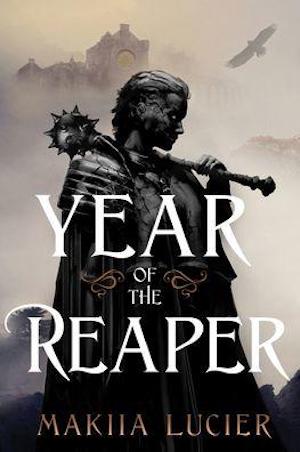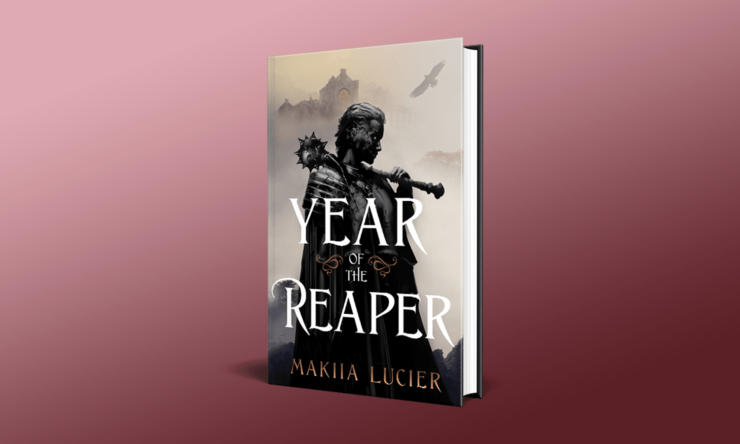Makiia Lucier’s latest young adult fantasy novel Year of the Reaper blends fantasy and mystery into one captivating tale. This story about two warring kingdoms hit hard by a plague is thoroughly engrossing and impossible to put down. I had planned to savor it over a weekend, and instead read it in a single afternoon. And as soon as I’d finished, all I wanted to do was go back and read it again.
For decades, the kingdoms of Oliveras and Brisa have been at war. It took a plague to force peace, but not before killing countless citizens on both sides or the border. The isolated mountain city of Palmerin was largely spared, but the surrounding countryside was ravaged by disease and destitution until almost nothing was left. In Palmerin, King Rayan, his new bride Princess Jehan of Brisa, and their infant son, sought refuge from the plague. There they were greeted by Lord Ventillas, a young man mourning his brother, Cas, who disappeared three years prior. And then one day Cas returns, haunted and broken.
As the others soon learn, Cas spent the last few years a prisoner of war in a Brisan camp, tortured, beaten, and sentenced to hard labor. The plague gave him the chance to escape, but his past follows him. Literally. For some inexplicable reason, Cas can see the dead, can interact and communicate with them. Unsure of how to use his newfound ability, he mostly keeps it a secret, afraid how his friends and family will judge or punish him. But Cas isn’t the only one hiding things from the people they love. He and Lena, the king’s younger sister and an apprentice historian by trade, discover an assassination plot against the royal family. In order to find the villain, they must dig up secrets that could bring the kingdom to its knees, shatter the tenuous treaty, and destroy the lives of good people.
Buy the Book


Year of the Reaper
One of the things I love most about Makiia Lucier’s work is how she takes a simple, trope-laden premise and turns it into something fresh and engaging. She comes up with creative ways to use each trope, and imbues them with fully realized characters and worlds that feel real. You’ve seen these sorts of characters and settings before, but not with this kind of depth and breadth. These are characters who have whole lives before and after this story, and thoughts and feelings beyond just what we see on the page.
If you’ve read any of Lucier’s other books, you know how good she is at worldbuilding. In this novel, we only see small portions of Oliveras and Brisa, but both feel expansive textured, as if they have long histories readers will never learn. (I can’t confirm this, but I suspect this book is set in the same world as Lucier’s Tower of Winds series; there is a reference to Coronado, a nation that also appears in Song of the Abyss.) This world feels vaguely European/British in that way many fantasy novels do. Whiteness is ingrained as the default in stories like these, but Lucier pushes back against it. Lucier, who is from Guam, has made her main characters look like her: “His skin, bronze in the summer, less so in the winter, had been passed down from his late mother, born and raised on the eastern archipelago.” and “Her skin was golden, a shade lighter than his, and her eyes were a deep brown, as dark as the innermost part of the woods.” She also pushes back against cisalloheteronormativity. While this kingdom prioritizes non-queer relationships, no one tries to punish or shame queer people. Their relationship is known and accepted and treated with respect.
It’s these little touches that take the novel from a satisfying diversion to thoroughly enjoyable. It helps, too, that Lucier opts for third person POV (sticking mostly to Cas’ viewpoint) and includes a prologue with characters who will become increasingly important as the story progresses. Lucier’s writing style is addictive and compelling. Everything moves at just the right pace, with no big crushes of backstory or wandering tangents. It’s tight, effective plotting that strikes the perfect balance between “too much” and “not enough.”
For some, the thought about reading a book with a deadly plague as a central plot point is a hard sell right now, but Year of the Reaper is worth it. Makiia Lucier is at her best here, with a thrilling mystery, light but intriguing fantasy, heartfelt relationships, a romance rooted in truth but still wonderfully swoon-y, and subtextual conversations on colonialism, oppression, the patriarchy, and homophobia. I’d happily read a whole series where Cas, Lena, and Ventillas go on adventures in Coronado…and maybe one where they meet Reyna, Elias, Ulises, and Mercedes? Whether this book remains a standalone or not, whether Lucier continues to explore this world of hers or not, I’m grateful for every story we’ve gotten thus far. I don’t know what else to say except I loved this book.
Year of the Reaper is published by Houghton Mifflin Harcourt.
Read an excerpt here.
Alex Brown is an Ignyte award-winning critic who writes about speculative fiction, librarianship, and Black history. Find them on twitter (@QueenOfRats), instagram (@bookjockeyalex), and their blog (bookjockeyalex.com).










